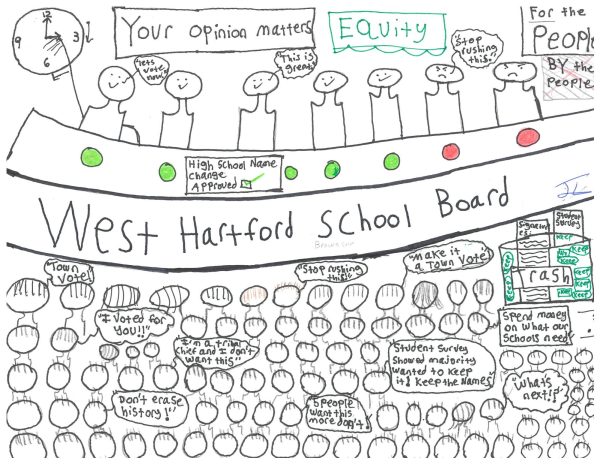Student Debt: The Demise of our Generation

Jack C, a junior at Hall High School, reviews a financial aid plan
For the duration of our high school careers, most of us have been told by family, friends, counselors, and others that higher education is the best next step in our lives. However, a college education is becoming less and less appealing because student loans continue to cast a shadow over our future plans.
According to Zack Friedman, a personal finance writer for Forbes, “There are 45 million borrowers who collectively owe more than $1.5 trillion in student loan debt in the U.S.” These whopping numbers only add to the stress that students feel about applying to college and for financial aid packages.
Business Insider referenced figures from the CollegeBoard, explaining that “from the late 1980s to 2018, the cost of an undergraduate degree has risen by 213% at public schools and 129% at private schools.”
A reasonable assumption can be made that costs will only continue to rise, making the long-term effects of borrowing the money needed for college detrimental to ones’ personal finances. Specifically, a college graduate may not be able to afford to put a down payment on their first home, plan to have a family sooner rather than later, or have access to the same retirement plan as someone with no outstanding debts.
Although this doesn’t apply to every single student, it is a critical situation that demands our immediate attention because fewer people will be motivated to go after careers with longer educational demands due to the fact that it will cost more money.
What are people doing to combat the business that colleges have become? Companies have begun paying their employees monthly installments to assist with paying off their debt. For example, a young professional who has just entered the workforce may receive payments of $100 a month in an attempt to relieve some of the student loan stress.
By doing so, a company not only encourages the professional to stay with them, but they also provide a greater “cushion” for an employee to return to school for a higher education which, in turn, would benefit the business greatly.
Also, Alanna Petroff of the CNN Money division noted countries such as France, Finland, Germany, Iceland, and a few others have abandoned the idea of paying for a college tuition. In the U.S., big economic changes such as this one would take time and adjustment, but it could be done.
Whatever path a student might choose as their post-grad option, they should be able to pick their career based on what they’re passionate about and not the dire financial situation they might find themselves in if they chase their dream.





